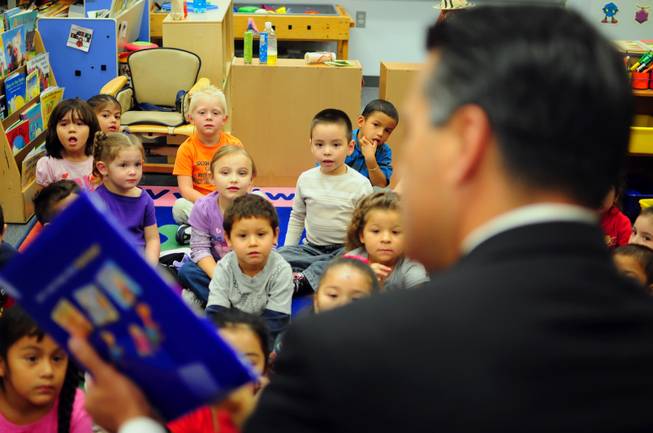
Gov. Brian Sandoval reads to schoolchildren as Principal Sherrie Gahn looks on at Whitney Elementary School on Thursday, Oct. 6, 2011, as part of the sixth annual Read for the Record, a nationwide literacy effort.
Friday, Dec. 7, 2012 | 2 a.m.
Sun coverage
- Number of top-performing schools in Clark County up sharply (11-29-2012)
- Nevada’s high school graduation rate lowest among states (11-27-2012)
- ‘Teacher diversity gap’ cause for concern in CCSD schools (11-25-2012)
- Report: Clark County’s charter schools fastest-growing in country (11-15-2012)
- More education news
Nevada schoolchildren have among the smallest vocabularies in the nation, according to a federal report released Thursday.
An analysis of the 2011 reading scores on the National Assessment of Educational Progress — also known as the Nation's Report Card — placed Nevada near the bottom of the nation in its students' ability to define words and understand what they are reading.
The National Assessment of Educational Progress reading test, which was administered to fourth- and eighth-graders, had 40 and 56 multiple-choice questions that tested students' vocabulary and reading comprehension. Students were given passages of between 400 and 800 words and asked to define words in context.
Nationally, three-fourths of fourth-graders were able to define words such as "created," "spread" and "underestimate." Less than half of students were able to define words such as "barren," "detected," "eerie," "flourish" and "prestigious."
In the eighth grade, three-fourths of students were able to recognize words such as "edible," "enticing," "grimace," "replicate," and "specialty." Fewer students were able to define words such as "responsible," "embedded," "solace," "vast" and "tolerate." Less than half of students knew the word "urbane."
Thursday’s report did not detail which words students in Nevada were not able to define.
Nevada students in both grade levels scored below the national average on the vocabulary questions.
The average score for fourth-graders nationally was 217. Nevada students scored 210, 44th in the nation. The highest-scoring state, Massachusetts, posted a 233; the lowest-scoring state, New Mexico, had a 202.
The average score for eighth-graders nationally was 263. Nevada students averaged 257, 45th in the nation. The highest-scoring state, Massachusetts, posted a 276; the lowest-scoring state, Mississippi, had a 253.
Although Nevada improved two spots in the state rankings since 2009 and was among the country's fastest-improving states in 2011, the report underscores the immense challenges Nevada public schools face in preparing students for a challenging new national reading standard.
Nevada is among 45 states that have adopted the Common Core State Standards, which requires a more rigorous reading curriculum and tests by the 2014-15 school year.
The Common Core standards emphasize deeper analytical thinking, not just the regurgitation of information. For example, instead of having students summarize a reading passage, they would be required to synthesize a response, demonstrating their critical-thinking skills.
Common Core standards also shift the curriculum's focus toward nonfiction writing and literature, which some educators argue would better prepare students for college.
Nevada students must ramp up their vocabulary quickly or they won't be able to comprehend more difficult reading passages, analyze them and craft an appropriate response. Research has found students with a larger vocabulary are better able to understand complex texts.
The lack of vocabulary skills explains Nevada's poor showing on the overall reading test. Those results, released last year, found that just a quarter of Nevada's fourth- and eighth-grade students were proficient in reading. (Thursday's report focused just on the vocabulary section of the National Assessment of Educational Progress reading assessment.)
Although this news wasn't surprising, it was worrisome, said State Superintendent Jim Guthrie.
A robust vocabulary will affect not just students’ performance in English class, but in other courses such as math, science and social studies, which require heavy reading and the ability to solve word problems.
"Reading is fundamental," Guthrie said. "You have to know how to read. These current conditions are inexcusable."
The state's high non-English-speaking student population could explain Nevada's low scores. About 76,500 students — or nearly one-fifth of all Nevada students — are considered English Language Learners.
Nationally, ELL students scored the lowest among all the different subgroups on the vocabulary question. While non-ELL students had an average score of 222, ELL students posted an average of 182.
Guthrie firmly believes ELL students as well as other lower-performing minority and special education student groups can succeed on the National Assessment of Educational Progress and upcoming Common Core tests.
To do that, Nevada is enacting a host of education changes, notably a new teacher evaluation system, Guthrie said. The evaluation system would help the state identify the best teachers and place them in front of the students who need the most help, he said.
Guthrie doesn't expect Nevada’s scores to rise anytime soon, however.
"All these take time. They won't have any payoff until another three to five years," he said. "But if we don't do it, we won't be competitive with other states and nations. We have to do it."

Join the Discussion:
Check this out for a full explanation of our conversion to the LiveFyre commenting system and instructions on how to sign up for an account.
Full comments policy